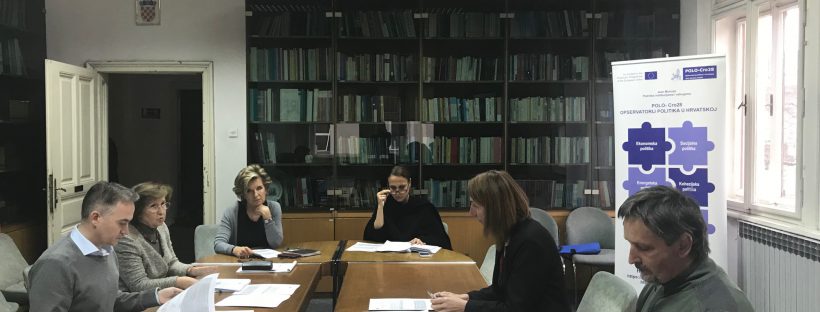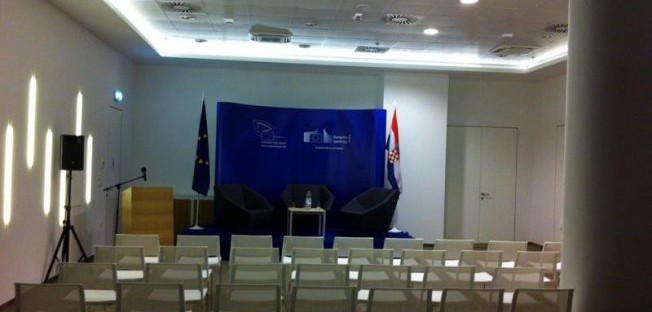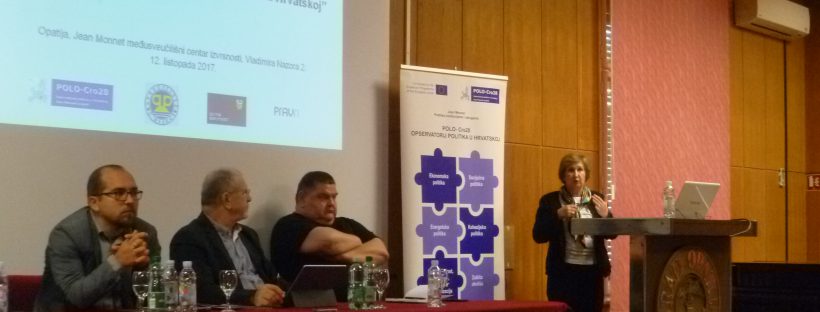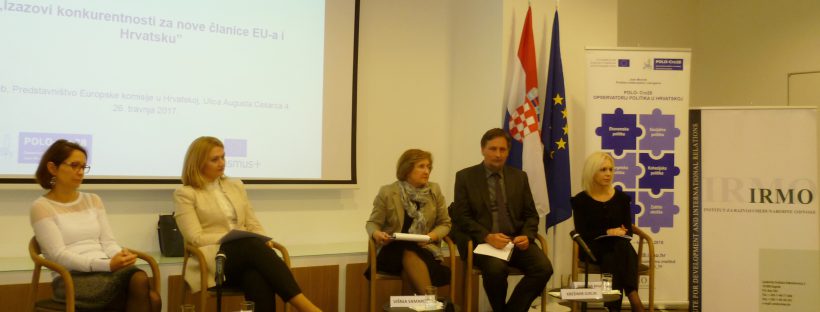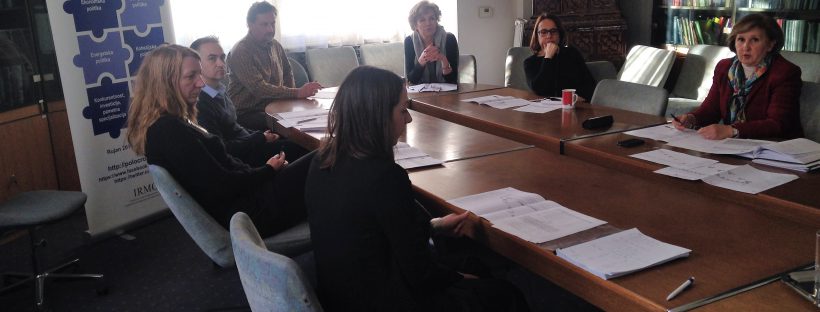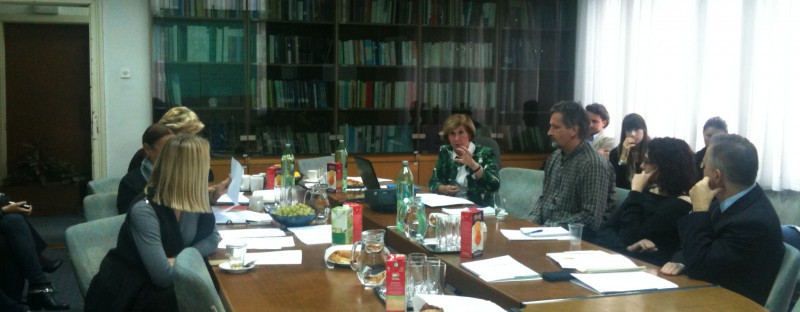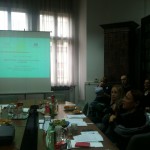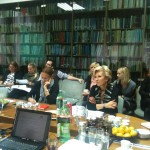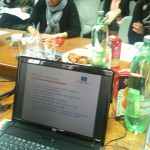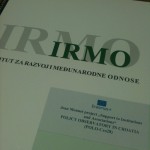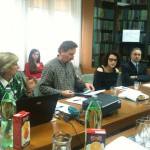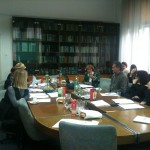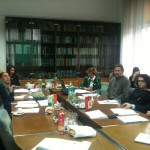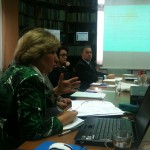Opatija: Jean Monnet Inter-University Centre of Excellence, Vladimira Nazora Street No. 2.
12 October 2017, 10.30-13.30 hours
The POLO round table “Energy Union – opportunities and challenges in Croatia” was held on Thursday 12 October 2017 in the Jean Monnet Inter-University Centre of Excellence in Opatija. The round table as the fifth such event within project “POLO-Cro28: Policy Observatory in Croatia” was organized in cooperation between IRMO the Faculty of Law at the University of Rijeka and the European Commission Representation in Croatia. The event was opened with welcoming words of Emil Priskić deputy mayor of Opatija, Vesna Crnić Grotić dean of the Faculty of Law from the University of Rijeka and Višnja Samardžija, POLO project coordinator from IRMO. Introductory part was followed by the panel which discussed the EUʼs Energy Union as a framework for implementation of reforms, technical and technological development within the Energy Union, market competition, energy transition as well as the role of civil society organizations in this area. Speakers at the event were Denis Redžepagić from the EC Representation in Croatia, Slavko Krajcar from the Faculty of Electrical Engineering and Computing at the University of Zagreb, Vlatka Butorac Malnar from the Faculty of Law at the University of Rijeka, Vedran Horvat from the Institute for Political Ecology from Zagreb and Vjeran Piršić from the association Eko Kvarner. The round table moderator was Ana-Maria Boromisa* from IRMO. The panel was followed by discussion.
The first speaker, Denis Redžepagić spoke about the concept and the policy of the European Energy Union. During Juncker’s term, the European Commission identified ten priorities until 2020, including the Energy Union and climate. The European energy policy agrees on the goals for the year 2020, while the goals for 2030 are still being discussed. The goals include three elements. The first is reduction of greenhouse gas emissions, the increase in the use of renewables and the increase of energy efficiency. The second element is the Paris Agreement as the most important document through which Europe has shown that it has taken the lead in energy transition and care about the climate and environment. The third element is the European Energy Union. The novelty of this Commission is increase in financial support for the European Energy Union, creation of the investment plan so that the private sector can be included in work on policies in the field of energy and the European External Investment Plan as a financial mechanism through which some segments of the energy policy are being carried out outside of the EU. European Energy Union is connected with all of the aforementioned concepts. It is a group of policies all aimed at priorities of the Commission – jobs, growth and investments. Three ideas of the European Energy Union are: modernization of the economy through the reduction of greenhouse gas emissions with the creation of jobs and economic growth, EU as the global leader in renewables while placing energy efficiency as a priority and lastly, to achieve a socially fair transition. The majority of legal solutions have already been made. Croatia has to work on the implementation of already existing directives and on the investment plan. Along with that there is a political segment which includes a joint effort from both Croatia and the European Commission within the political bodies and associations with a goal to connect countries regarding energetics.
Prof. dr. sc. Slavko Krajcar spoke about technical and technological development within the European Energy Union. In the beginning he mentioned that change is important and that we have to reboot our current way of thinking. He continued by shortly repeating the significance of the Paris Agreement and called for a change in the economic paradigm. European Union, after the Paris Agreement, changed its rhetoric of „must“ from 2020 Climate & Energy Package to „can“ rhetoric where every country says what it can do. Using political tools it will be transposed that everyone does a little bit extra so that the sum equals the targeted values. The goal of clean energy for everyone is reachable through the acceleration of research and innovation as long as these innovations reach the market. The opportunity for the new economy comes from the system of five D’s: decarbonisation, democratization, digitalization, diversification and disruption. Apart from the political solution, the European Union includes experts in the creation of Strategic Energy Technology Plans (SET-Plans). These plans act as certain tools. There was a revision of SET-Plans after the Paris Agreement with the focus now being on: goal oriented research, integrated approach, new management structure and partnership strengthening. SET-Plans are partly financed from the European Union, for example from the Horizon 2020 program, and partly from national programs. The system of higher education as well as the European Technology and Innovation Platform – ETIP and Sustainable Nuclear Energy Technology – SNET platform have been incorporated in the idea of the European Energy Union. It was concluded that the problem of energy efficiency can only be solved by strengthening of democracy and public participation.
Vlatka Butorac Malnar focused on the electricity market in Croatia and connected it to the policies of competition. Competition law is based on the postulate that the more entrepreneurs are involved in an activity, the more likely it is that there will be competition between them. Competition increases economic growths and this is seen as a positive phenomenon. Competition rules are regulated both on the EU and at the national level. The rules prohibit cartel agreements, abuse of dominant position and introduce control of concentration. Along with that, state aid is forbidden, except in special cases. Electricity market is by nature a monopoly market. The stance of the EU is that even these markets should be liberalized. In 1992 the EU started to liberalize the electricity market. The year 2007 confirmed sluggishness of the whole process when there was still a concentration and de facto monopoly markets within member states. Today the electricity market is divided into activities that remain public (transfer of electric energy, distribution and organization of the market) and market activities (production, supply and trade). In Croatia, HEP dominates in all activities. This shows that the process of liberalization in Croatia had a good start but never really took off. Renewables are the future because in this field there are big opportunities for growth and competition with all of the benefits of competition. Along with that, the state is able to provide aid in the renewables market.
Vedran Horvat talked about how the Energy Union as a concept and in practice reaches people. Energy Union represents a shift towards low carbon energy, the abandonment of fossil fuel focus, a more flexible, integrated and resilient energy system on the EU level and the relinquishment of the need for coal. The goals of the Energy Union are focused around energy security (the need for more autonomy in the context of outside energy providers), economic effect (connected with the circular economy) and ecological sustainability (favourable influence on the environment and the reduction of greenhouse gas emissions). Some of the priorities of the Energy Union are investments in energy efficiency, separation of economic growth and CO2 emissions, decrease in dependency on gas and energy importers and an increase in the electrification of the energy system. The process of energy transition poses some important questions. Firstly, there is a question of the actors that serve as drivers of the transition. Will there be any losers of the energy transition and what is the social effect of the transition? To what degree is transition a matter of market and to what degree is it a matter of solidarity? Are there any limits to the reach of technological revolution? The opportunities that the Energy Union brings are decarbonisation, a local answer to climate change, the creation of a decentralized energy system and energy efficiency. Croatia is lagging behind in the process of energy transition compared to other EU member states. There is not enough social pressure for the transition. According to polls Croatians have very positive opinion on the transition to renewables, the problem lies in the fact that their opinions are rarely heard. In Croatia HEP is both an opportunity and a limiting factor. With HEP in its current state, Croatia cannot start the energy transition.
Vjeran Piršić states that the whole process of energy transition started too late. The data from the European Environment Agency shows that 80% of the premature deaths of Europeans are caused by particles found in fossil fuels. Energy transition had to start several decades ago, like it did on the island Krk. Currently fourteen projects are active on Krk. The biggest one is the project of making Krk an energy independent and CO2 neutral island by the year 2030. This project is in no way linked to big companies. The change to energy efficiency has to come from the local level and from ordinary people who will, instead of asbestos place solar panels over their roofs. Wind energy should be locally owned and provide free energy once the infrastructure is paid off. The main point is that there has to be field work. The solution lies, in what seem to be, small projects that contribute to sustainability and energy efficiency.
The panel was followed by discussion moderated by Dr. Ana-Maria Boromisa. Some of the issues tackled related to the position of Croatia compared to other new EU member states, role of the market in sustainability, preconditions for launching change, future prices of energy, future of the thermal power plant Plomin, LNG terminal etc.
The discussion highlights are the following:
- Situation in Croatia is often compared with countries in the region
- Prerequisite for energy transition is an informed consumer and technology
- Energy transition in Croatia is yet to be launched, energy sector is not democratized and there is no public control over HEP
- Citizens are passive in energy policy implementation
- Various energy markets are complementary
Several recommendations can be drawn from this round table:
- Croatia should not compare with countries that are doing less. Instead, it should either find its own niche or compare with best-performers
- Promote the idea of energy democracy through public communications
- Promote active participation of citizens in implementation of energy policy
- enabling them to become prosumers (including promotion of energy cooperatives with legislative incentives)
- strengthening democratization and public control over HEP
- Promote the triple helix R&I and stimulate (financially) the inclusion of research institutions in ERA (European Research Area)
- Direct part of the public finances used for research into projects in which the market participates within SET-Plans of the EU
- Solving the problem of energy poverty should be should be connected to energy efficiency projects and renewable energy projects.
Program
*supported by HRZZ Research Project IP -11-2013

